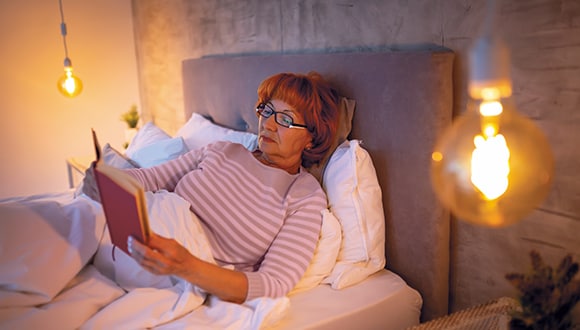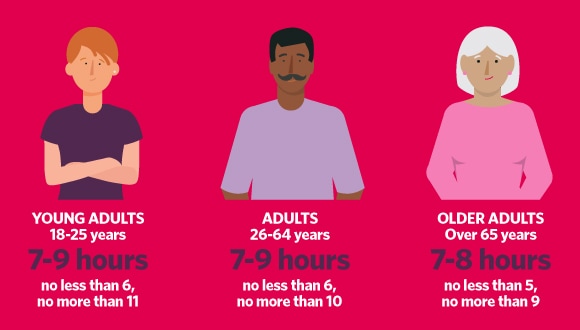How to sleep better as you get older
Published April 2024 | 5 min read
Expert contributor Associate Professor Melinda Jackson, sleep researcher and psychologist at Monash University
Words by Michelle Herbison
Many people experience sleep problems with age. Here’s why quality sleep is so crucial for our health as we get older and how many hours you should aim for.
A good night’s sleep plays a vital role in our overall health and wellbeing, but getting a good dose of shut-eye can be challenging as we get older.
According to the Sleep Health Foundation, over half of adult Australians are experiencing at least one sleep symptom three or more times a week, and 47% of those 65 years and over report waking up a lot overnight.
"Duration, quality and timing of sleep are the three factors that are really critical for our sleep health, and all of these things change as we age, for different reasons," explains Associate Professor Melinda Jackson, a sleep researcher and psychologist at Monash University.

Age and sleep quality: do older people need less sleep?
While some studies suggest that changes in sleep patterns and ageing are connected, "reduced sleep time is not an inherent part of the ageing process," says Assoc Prof Jackson. What is inevitable, however is a reduction in the quality of sleep.
There are four different stages of sleep, which are repeated throughout the night in 90 to 120-minute cycles.
Non-rapid eye movement (non-REM) sleep:
- Stage one: when you’re first falling asleep, the body and brain activity is beginning to slow but they’re not fully relaxed. It's easy to be woken up in this stage.
- Stage two: your body is moving into a more subdued state. Muscles relax, breathing slows and your body temperature drops.
- Stage three: this is known as deep sleep. Muscle tone, pulse and breathing rate slows further and it’s harder to wake you up. Experts believe this stage is critical to restorative sleep, allowing for body recovery and growth.
Rapid eye movement (REM) sleep
During REM sleep (stage 4 of sleep), your brain activity, heart rate and blood pressure increases and you're more likely to dream. This stage is thought to be important for learning and creating new memories.
As we get older, we tend to spend more time in stages one and two and less time in stage three sleep, which is the deep restorative stage. Plus, many of us find our circadian rhythm – our built-in body clock – changes as we get older.
"Older adults tend to go to sleep earlier, and that means they wake earlier in the morning," says Assoc Prof Jackson. "They often find their sleep is more fragmented, and because of the quality of sleep changing, they’re more easily woken."
Other issues can also impact our sleep as we get older, such as pain, comorbidities like arthritis, osteoporosis and Parkinson’s disease, and psychosocial issues such as stress and depression.

Age and hours of sleep: how many hours of sleep should I be getting?
You may find it surprising that the age and hours of sleep advice from the Sleep Health Foundation shifts only very slightly as we get older.
- Young adults (18 to 25 years): 7 to 9 hours (no less than six, no more than 11).
- Adults (26 to 64 years): 7 to 9 hours (no less than six, no more than 10).
- Older adults (over 65 years): 7 to 8 hours (no less than five, no more than nine).
Another important point to note about these recommendations is that they cover a 24-hour period. If you’re one of the 40% of people aged 65 years and over who nap during the day, it’s not hugely problematic, says Assoc Prof Jackson.
"We recommended having short naps of 30 to 90 minutes, so that it doesn’t affect your sleep the next night," she adds.
Menopause and sleep: what’s the impact?
According to the Sleep Foundation, about 30% of women say they have some type of problem sleeping more than three times a week before they go through menopause. But this percentage goes up by two or three times for women who are going through menopause. The culprit is likely to be the drop in oestrogen that comes with menopause, which leads to symptoms like hot flushes, cold sweats and night sweats.
Monique, 62, had a healthy, eight-hours-a-night sleep routine until menopause hit.
"Now I’m lucky to get an uninterrupted night's sleep, waking at least once every night. I also struggle to fall asleep, and there are nights when I'm lucky to get three hours of shut-eye," she says.
After unsuccessfully trying various sleep aids – including herbal teas, melatonin and listening to calming music – Monique has become increasingly worried about the long-term effects on her health.
"Chronic lack of sleep has impacted my overall quality of life," she says. "I'm moody, often have headaches and struggle with brain fog – and I'm too tired to exercise most days. I'm permanently tired and grumpy!"
Assoc Prof Jackson reassures anyone in a similar position to Monique that emerging evidence suggests some treatments for insomnia can reduce menopause symptoms, and vice versa. These include:
- Cognitive behavioural therapy for insomnia (CBT-I) which uses stimulus control, sleep restriction and relaxation training to restructure thoughts and feelings that contribute to insomnia.
- Sleep restriction therapy which uses strict sleep schedules to improve sleep efficiency – the ratio of time a person spends asleep to time spent in bed – and restore healthy sleep patterns.
Ageing and sleep disorders: when should I see a doctor?
If you're worried that your changing sleep patterns might be leading to something more serious, it’s worth understanding the signs and symptoms of the two most common sleep disorders – sleep apnoea and insomnia.
Sleep apnoea and ageing
Sleep apnoea is a potentially serious sleep disorder that happens when your throat muscles relax too much during sleep, causing breathing to stop and start. Developing sleep apnoea is more likely as we age because the overall muscle weakening that comes with ageing can include a collapse of the upper airway muscles during sleep, explains Assoc Prof Jackson.
"The most common reported symptom of sleep apnoea would be snoring from a bed partner, but symptoms can present differently," she says. "Fatigue and sleepiness are most common in men, but women are more likely to report morning headaches and mood changes. Often, people with sleep apnoea are not aware they have it."
So, if you’re having persistent problems during the day with memory, concentration, decision-making or regulating your emotions, a lack of oxygen at night might be to blame – and that’s when it’s worth checking in with your GP. HCF’s partnership with online video GP service GP2U means that all members with health cover can access a standard GP consultation (up to 10 minutes) for a fee of $50.
Insomnia and ageing
While a third of adults may experience insomnia at some point in life, only about 10% of cases are considered severe enough to be considered a sleep disorder.
As you get older, if you’re having trouble falling asleep and staying sleep, or are waking up earlier than you used to, it may not be cause for alarm. That’s as long as you’re not too worried or frustrated about your sleep, says Assoc Prof Jackson.
"If it's impacting on your ability to remain alert, you're falling asleep at the wheel, or it's impacting on your emotional regulation and moods, then you really need to speak to your GP," she advises.
Assoc Prof Jackson describes CBT-I as the "gold standard" for treating insomnia.
Online cognitive behavioural therapy tools like This Way Up* can give you a version of this treatment from the comfort of your bedroom, helping you to understand and improve mental challenges like stress, insomnia, worry, anxiety and depression that might be affecting sleep. HCF will cover the cost of eligible online cognitive behavioural therapy courses provided by This Way Up up to your annual limit.
How to get better sleep: what sleep habits can I improve?
If you're looking for a better night's sleep, start by making sure you have good sleep hygiene – from following a consistent routine to avoiding caffeine, nicotine and alcohol before bed. One 2022 study found aerobic or resistance training helped with sleep in older adults, too.
"Some people find a hot shower in the evening can be helpful," adds Assoc Prof Jackson. "When you get out, your body temperature drops quite rapidly, which can help with sleep onset."
Importantly, she says, don’t be too alarmed if you do have a bad night. "Often your sleep drive will be higher the next night, and you will hopefully find you fall asleep more easily."
Build better sleep habits
Need support for better shut-eye? Thanks to our partnership with Sleepfit Solutions, eligible HCF members^ can get a free 12-month subscription to the Sleepfit app, designed to improve sleep and overall wellbeing.
Related articles
Effects of sleep deprivation
We all have the occasional bad night’s sleep, but not getting enough shut-eye can be harmful to your health. Here’s how to build healthier sleep patterns.
How to improve insomnia
Women are more likely to experience insomnia than men, due to hormones and higher rates of anxiety. Struggling to sleep? Here are some expert tips.
5 tips for healthy ageing
Your lifestyle can impact how fit and well you feel as you age. Here are the science-backed ways to feel happier, fitter and stronger for longer.
Relieving menopause symptoms
If you’re approaching or experiencing menopause, you’re probably aware of how it can affect your mind and body. Here's how to manage the symptoms.
Important information
* This service is not affiliated or associated with HCF in any way. You should make your own enquiries to determine whether this service is suitable for you. If you decide to use this service, it’ll be on the basis that HCF won’t be responsible, and you won’t hold HCF responsible, for any liability that may arise from that use.
^ Eligibility criteria apply. See hcf.com.au/sleepfit for details.
This communication contains information which is copyright to The Hospitals Contribution Fund of Australia Limited (HCF). It should not be copied, disclosed or distributed without the authority of HCF. Except as required by law, HCF does not represent, warrant and/or guarantee that this communication is free from errors, virus, interception or interference. All reasonable efforts have been taken to ensure the accuracy of material contained on this website. It’s not intended that this website be comprehensive or render advice. HCF members should rely on authoritative advice they seek from qualified practitioners in the health and medical fields as the information provided on this website is general information only and may not be suitable to individual circumstances or health needs. Please check with your health professional before making any dietary, medical or other health decisions as a result of reading this website.